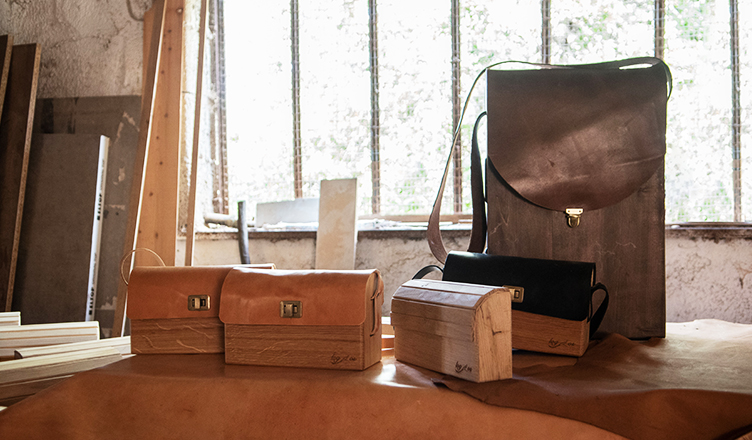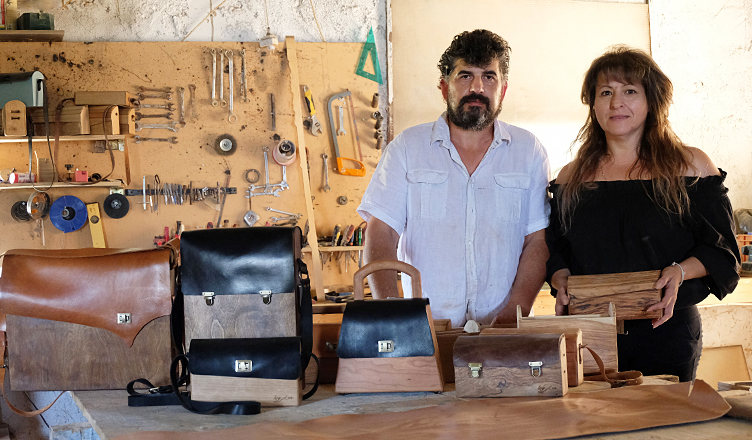The Mingei team visited Axos, a mountainous Greek village located on the northern slopes of Psiloritis Mountain, known for its history and its rich tradition. There, we had the opportunity to meet and interview Nikos Manias and Niki Koutantou, who are the owners and the inspirers of a family owned workshop of carpentry. Nikos and Niki, driven by their love for authentic products and making use of the twenty-five-year experience of Nikos, took the initiative one year ago to start the construction of wooden products that could be used every day by people. They started making a rich variety of handmade, wooden handbags, and sell them to locals and tourists.
In this video, Nikos and Niki tell about their carpentry workshop. English subtitles are available in the settings, at the bottom of the screen.
Natural materials
Based on their love for authentic products Nikos and Niki decided to design and create in their workshop handmade wooden handbags. Their main goal is to make good use of natural materials, such as wood and leather in order to construct functional artifacts for both women and men. Wood is a natural material that can be easily found in the wider area of Axos Village and can come from different kind of trees for example, olive trees, cherry trees, beech trees and oak trees. With sensitivity and desire for a controlled exploitation of natural resources, the woodworker collects wood from dried trees and processes them in a suitable way until they take shape. In this way, they do not intervene in the environment by destroying it but on the contrary, for each dry tree a new one is planted aiming to maintain the ecosystem balance. The whole idea is based on giving life to a material that is already considered dead and converting it into a useful object.

Logos
This idea is emphasized by the brand name ‘Logos’. It stems from the Greek word «Λόγος» which includes several meanings, such as thought, speech, insight, and inspiration. Furthermore, the word ‘Logos’ consists of the English word ‘log’ and the suffix –os that is the ending of the word ‘Lagos’, the place name of the area where the workshop is situated. As the owners tell, “Logos is our face in what we do. We want to show people how we can create useful objects for our daily life from a product that exists in nature and is dead.”
Construction
The woodworker collects the trunks of the trees and cuts them by using the band saw. Afterwards, the craftsman places them into a wood fired kiln in order for the humidity to be eliminated and then he cuts the wood again with the band saw to create thin sheets of wood, on which he draws the patterns and then start constructing the handbags. A large amount of designs can be created, such as handbags, briefcases and bags for portable computers, some of which are made only from wood and others combine wood and colorful real leathers. Besides the offered variety, every handbag can be custom made to meet your special wishes and an effort of four to five working days is required to create this final wooden unique product of high construction and aesthetics.
The video above shows a 3D reconstruction of one of the handmade handbags of Nikos Manias, made from natural materials, such as olive wood and real leather.
Revival of crafts
The construction of handmade bags gives visitors the opportunity to see up close the process of processing natural materials, such as wood from trees that thrive in the surrounding area. The revival and preservation of old traditional professions contributes to the economy of the place where they flourish, boosting trade and offering new jobs, as well as to the touristic domain.
At the same time, it allows scientists in general – and us from the Mingei project – to study the manners and customs of the area, as manifested through the objects and the process of their construction, making both tangible and intangible aspects of Heritage Culture accessible in this way.

